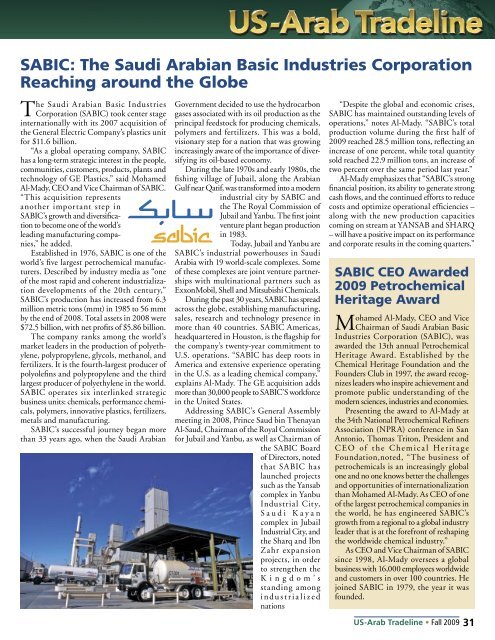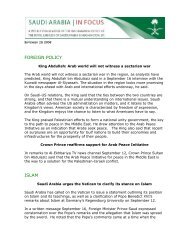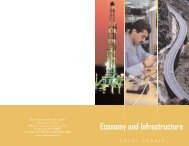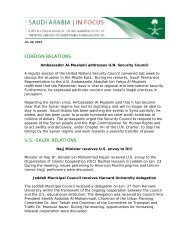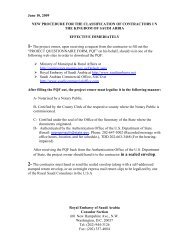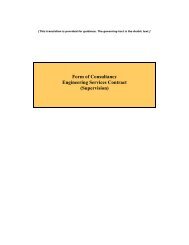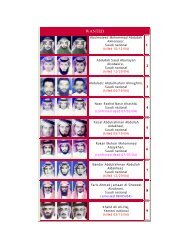Saudi Arabia & KAUST - National US-Arab Chamber of Commerce
Saudi Arabia & KAUST - National US-Arab Chamber of Commerce
Saudi Arabia & KAUST - National US-Arab Chamber of Commerce
You also want an ePaper? Increase the reach of your titles
YUMPU automatically turns print PDFs into web optimized ePapers that Google loves.
SABIC: The <strong>Saudi</strong> <strong><strong>Arab</strong>ia</strong>n Basic Industries Corporation<br />
Reaching around the Globe<br />
The <strong>Saudi</strong> <strong><strong>Arab</strong>ia</strong>n Basic Industries<br />
Corporation (SABIC) took center stage<br />
internationally with its 2007 acquisition <strong>of</strong><br />
the General Electric Company’s plastics unit<br />
for $11.6 billion.<br />
“As a global operating company, SABIC<br />
has a long-term strategic interest in the people,<br />
communities, customers, products, plants and<br />
technology <strong>of</strong> GE Plastics,” said Mohamed<br />
Al-Mady, CEO and Vice Chairman <strong>of</strong> SABIC.<br />
“This acquisition represents<br />
another important step in<br />
SABIC’s growth and diversification<br />
to become one <strong>of</strong> the world’s<br />
leading manufacturing companies,”<br />
he added.<br />
Established in 1976, SABIC is one <strong>of</strong> the<br />
world’s five largest petrochemical manufacturers.<br />
Described by industry media as “one<br />
<strong>of</strong> the most rapid and coherent industrialization<br />
developments <strong>of</strong> the 20th century,”<br />
SABIC’s production has increased from 6.3<br />
million metric tons (mmt) in 1985 to 56 mmt<br />
by the end <strong>of</strong> 2008. Total assets in 2008 were<br />
$72.5 billion, with net pr<strong>of</strong>its <strong>of</strong> $5.86 billion.<br />
The company ranks among the world’s<br />
market leaders in the production <strong>of</strong> polyethylene,<br />
polypropylene, glycols, methanol, and<br />
fertilizers. It is the fourth-largest producer <strong>of</strong><br />
polyolefins and polypropylene and the third<br />
largest producer <strong>of</strong> polyethylene in the world.<br />
SABIC operates six interlinked strategic<br />
business units: chemicals, performance chemicals,<br />
polymers, innovative plastics, fertilizers,<br />
metals and manufacturing.<br />
SABIC’s successful journey began more<br />
than 33 years ago, when the <strong>Saudi</strong> <strong><strong>Arab</strong>ia</strong>n<br />
Government decided to use the hydrocarbon<br />
gases associated with its oil production as the<br />
principal feedstock for producing chemicals,<br />
polymers and fertilizers. This was a bold,<br />
visionary step for a nation that was growing<br />
increasingly aware <strong>of</strong> the importance <strong>of</strong> diversifying<br />
its oil-based economy.<br />
During the late 1970s and early 1980s, the<br />
fishing village <strong>of</strong> Jubail, along the <strong><strong>Arab</strong>ia</strong>n<br />
Gulf near Qatif, was transformed into a modern<br />
industrial city by SABIC and<br />
the The Royal Commission <strong>of</strong><br />
Jubail and Yanbu. The first joint<br />
venture plant began production<br />
in 1983.<br />
Today, Jubail and Yanbu are<br />
SABIC’s industrial powerhouses in <strong>Saudi</strong><br />
<strong><strong>Arab</strong>ia</strong> with 19 world-scale complexes. Some<br />
<strong>of</strong> these complexes are joint venture partnerships<br />
with multinational partners such as<br />
ExxonMobil, Shell and Mitsubishi Chemicals.<br />
During the past 30 years, SABIC has spread<br />
across the globe, establishing manufacturing,<br />
sales, research and technology presence in<br />
more than 40 countries. SABIC Americas,<br />
headquartered in Houston, is the flagship for<br />
the company’s twenty-year commitment to<br />
U.S. operations. “SABIC has deep roots in<br />
America and extensive experience operating<br />
in the U.S. as a leading chemical company,”<br />
explains Al-Mady. The GE acquisition adds<br />
more than 30,000 people to SABIC’S workforce<br />
in the United States.<br />
Addressing SABIC’s General Assembly<br />
meeting in 2008, Prince Saud bin Thenayan<br />
Al-Saud, Chairman <strong>of</strong> the Royal Commission<br />
for Jubail and Yanbu, as well as Chairman <strong>of</strong><br />
the SABIC Board<br />
<strong>of</strong> Directors, noted<br />
that SABIC has<br />
launched projects<br />
such as the Yansab<br />
complex in Yanbu<br />
Industrial City,<br />
S a u d i K a y a n<br />
complex in Jubail<br />
Industrial City, and<br />
the Sharq and Ibn<br />
Zahr expansion<br />
projects, in order<br />
to strengthen the<br />
K i n g d o m ’ s<br />
standing among<br />
i ndu s t r i a l i z e d<br />
nations<br />
“Despite the global and economic crises,<br />
SABIC has maintained outstanding levels <strong>of</strong><br />
operations,” notes Al-Mady. “SABIC’s total<br />
production volume during the first half <strong>of</strong><br />
2009 reached 28.5 million tons, reflecting an<br />
increase <strong>of</strong> one percent, while total quantity<br />
sold reached 22.9 million tons, an increase <strong>of</strong><br />
two percent over the same period last year.”<br />
Al-Mady emphasizes that “SABIC’s strong<br />
financial position, its ability to generate strong<br />
cash flows, and the continued efforts to reduce<br />
costs and optimize operational efficiencies –<br />
along with the new production capacities<br />
coming on stream at YANSAB and SHARQ<br />
– will have a positive impact on its performance<br />
and corporate results in the coming quarters.”<br />
SABIC CEO Awarded<br />
2009 Petrochemical<br />
Heritage Award<br />
Mohamed Al-Mady, CEO and Vice<br />
Chairman <strong>of</strong> <strong>Saudi</strong> <strong><strong>Arab</strong>ia</strong>n Basic<br />
Industries Corporation (SABIC), was<br />
awarded the 13th annual Petrochemical<br />
Heritage Award. Established by the<br />
Chemical Heritage Foundation and the<br />
Founders Club in 1997, the award recognizes<br />
leaders who inspire achievement and<br />
promote public understanding <strong>of</strong> the<br />
modern sciences, industries and economies.<br />
Presenting the award to Al-Mady at<br />
the 34th <strong>National</strong> Petrochemical Refiners<br />
Association (NPRA) conference in San<br />
Antonio, Thomas Triton, President and<br />
C EO <strong>of</strong> t he C hem ic a l Herit a g e<br />
Foundation,noted, “The business <strong>of</strong><br />
petrochemicals is an increasingly global<br />
one and no one knows better the challenges<br />
and opportunities <strong>of</strong> internationalization<br />
than Mohamed Al-Mady. As CEO <strong>of</strong> one<br />
<strong>of</strong> the largest petrochemical companies in<br />
the world, he has engineered SABIC’s<br />
growth from a regional to a global industry<br />
leader that is at the forefront <strong>of</strong> reshaping<br />
the worldwide chemical industry.”<br />
As CEO and Vice Chairman <strong>of</strong> SABIC<br />
since 1998, Al-Mady oversees a global<br />
business with 16,000 employees worldwide<br />
and customers in over 100 countries. He<br />
joined SABIC in 1979, the year it was<br />
founded.<br />
<strong>US</strong>-<strong>Arab</strong> Tradeline • Fall 2009 31


